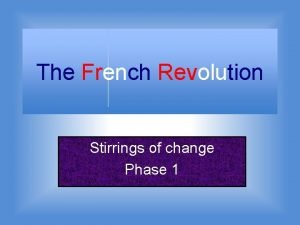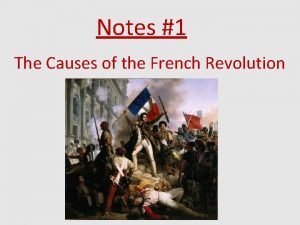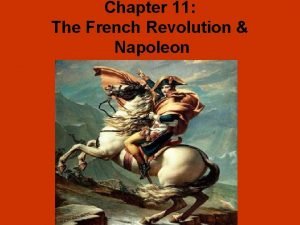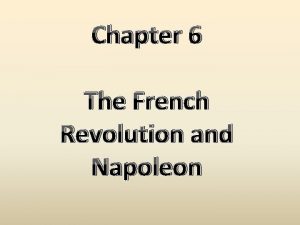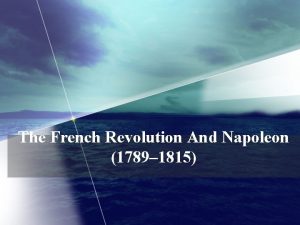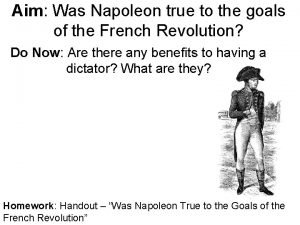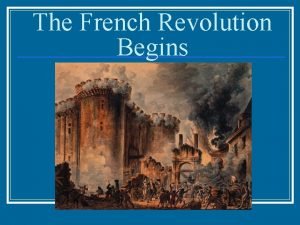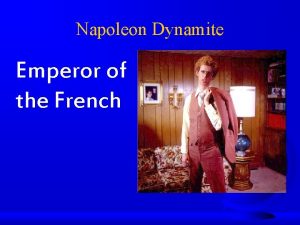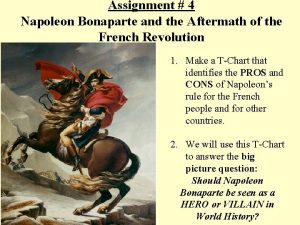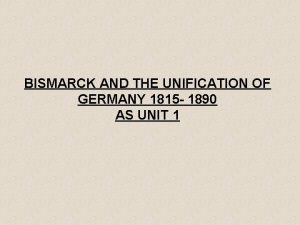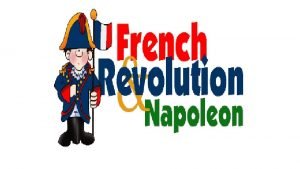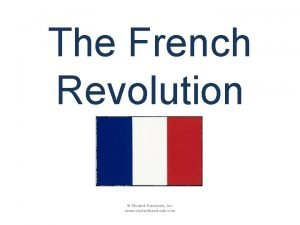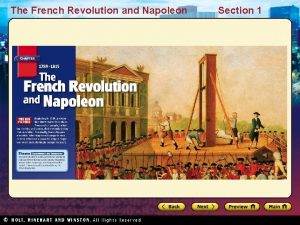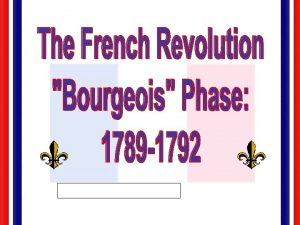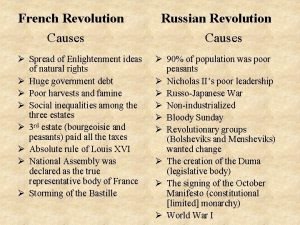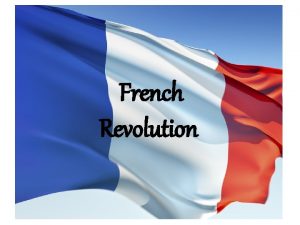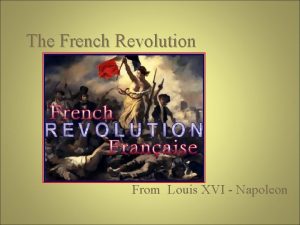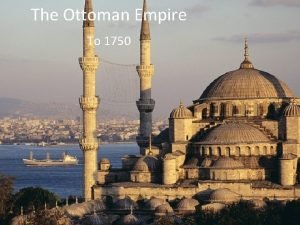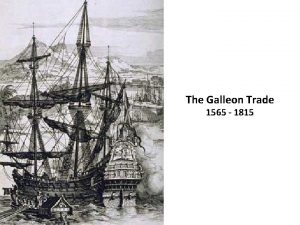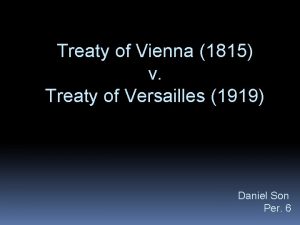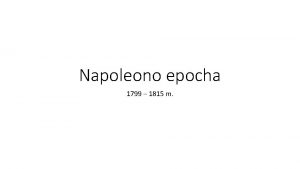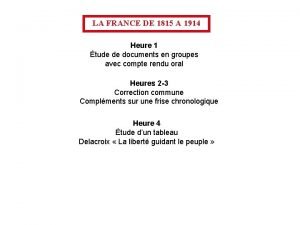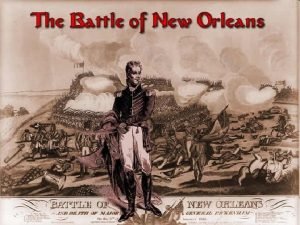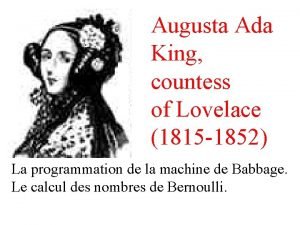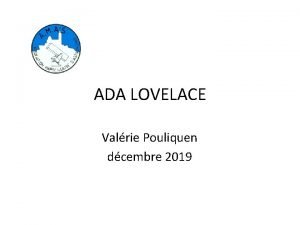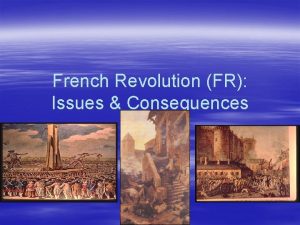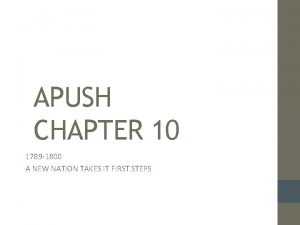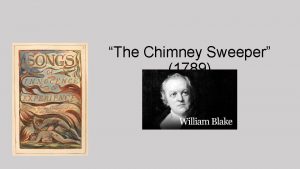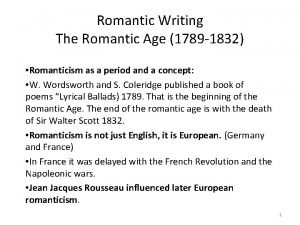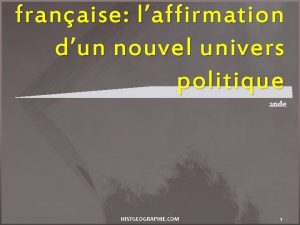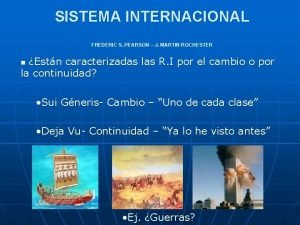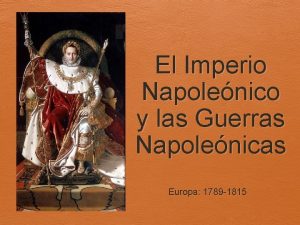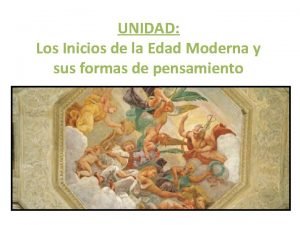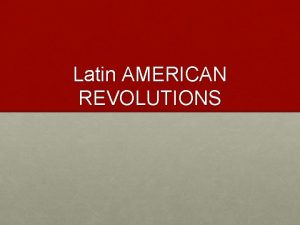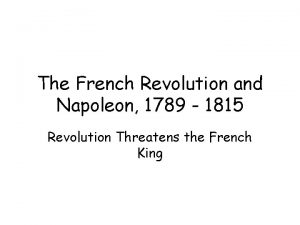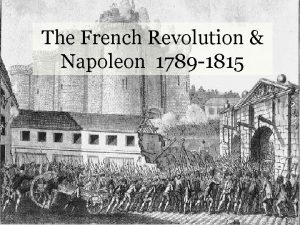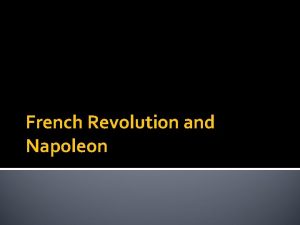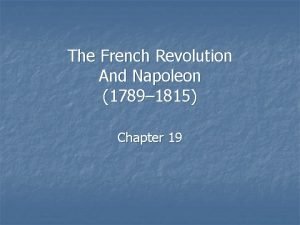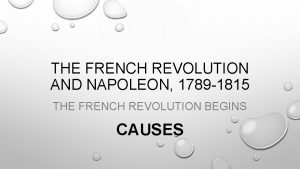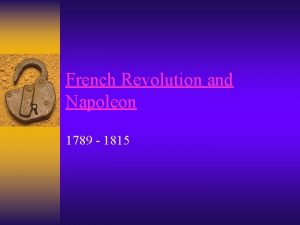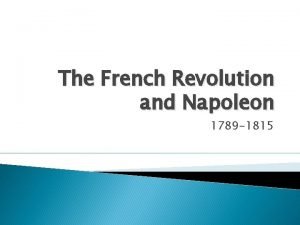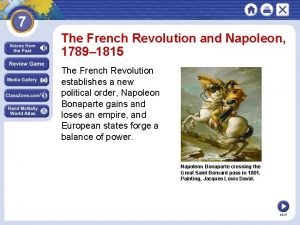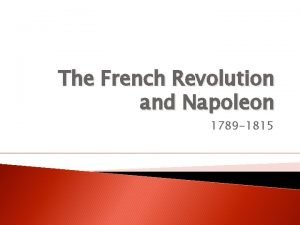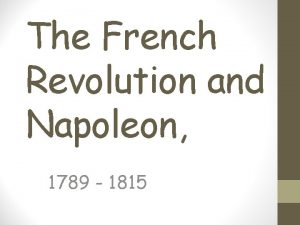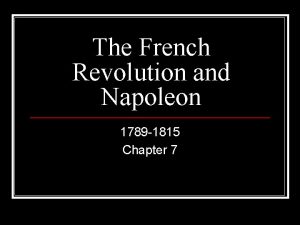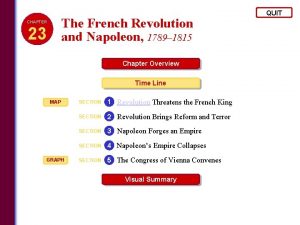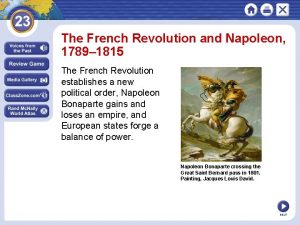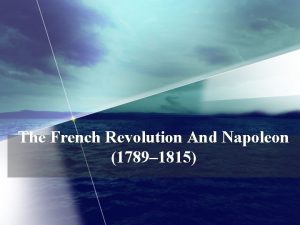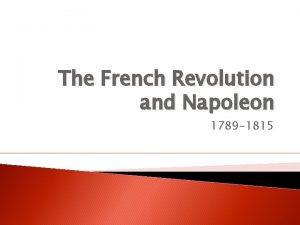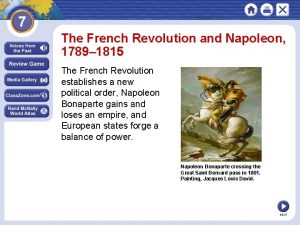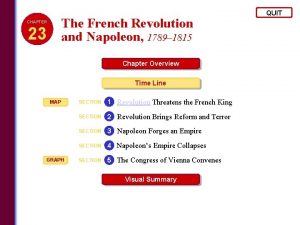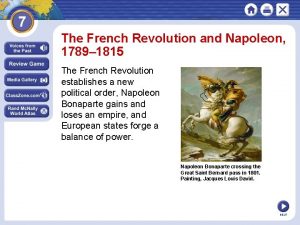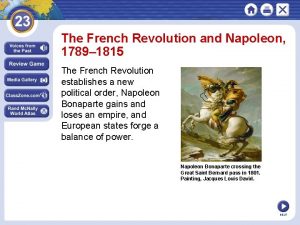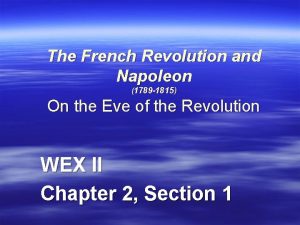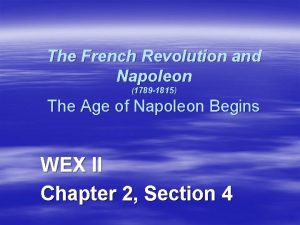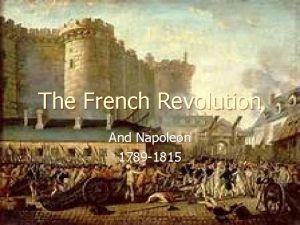The French Revolution and Napoleon 1789 1815 Attitudes















































- Slides: 47

The French Revolution and Napoleon 1789 -1815

Attitudes & actions of monarchy & court Fear of Counter. Revolution Religious divisions The Causes of Instability in France 1792 - 1795 Economic Crises War Political divisions

The September Massacres, 1792 (The dark side of the Revolution!) M Rumors: anti-revolutionary political prisoners were plotting to break out & attack from the rear the armies defending France, while the Prussians attacked from the front. M Buveurs de sang [“drinkers of blood. ”] over 1000 killed! M It discredited the Revolution among its remaining sympathizers abroad.

The National Convention (September, 1792) M 1 st Act was the formal abolition of the monarchy on September 22, 1792. § The Year I of the French Republic. M The Decree of Fraternity § Offered French assistance to any subject peoples who wished to overthrow their governments. When France sneezes, all of Europe catches cold!

Attempts to Control the Growing Crisis 1. Revolutionary Tribunal in Paris try suspected counter-revolutionaries. A. Representatives-on-Mission esent to the provinces & to the army. ehad wide powers to oversee conscription. B. Watch Committees [comité de surveillance] ekeep an eye on foreigners & suspects. C. Sanctioned the trial & execution of rebels and émigrés, should they ever return to France.

Attempts to Control the Growing Crisis 2. The printing of more assignats to pay for the war. 3. Committee of Public Safety [Co. PS] e to oversee and speed up the work of the government during this crisis. 4. Committee of General Security [CGS] e responsible for the pursuit of counter-revolutionaries, the treatment of suspects, & other internal security matters.

Committee for Public Safety M M M Revolutionary Tribunals. 300, 000 arrested. 16, 000 – 50, 000 executed.

The Reign of Terror is nothing other than justice, prompt, severe, inflexible. -Robespierre Let terror be the order of the day! c c The Revolutionary Tribunal of Paris alone executed 2, 639 victims in 15 months. The total number of victims nationwide was over 20, 000!

D. The Reign of Terror � 1. Faced with foreign invaders and the threat of domestic rebellion, the National Convention established the Committee of Public Safety to defend France and safeguard the Revolution. � 2. Led by Robespierre, the Committee of Public Safety exercised dictatorial power as it carried out a Reign of Terror. � 3. In the name of creating a Republic of Virtue, Robespierre executed the queen, his chief rivals, and thousands of ‘dangerous’ class enemies.

Different Social Classes Executed 8% 7% 28% 25% 31%

The “Monster” Guillotine The last guillotine execution in France was in 1939!

E. The ‘Nation in Arms’ � 1. While the Terror crushed domestic dissent, Robespierre turned to the danger posed by the First Coalition. In 1793, the Committee of Public Safety proclaimed a ‘levee en masse’ decreeing compulsory military service for all men between the ages of 18 and 40. � 2. The levee en masse created a national military based upon mass participation. This marked the first example of the complete mobilization of a country for war.

� 3. Motivated by patriotism and led by corps of talented young officers that included Napoleon Bonaparte, France’s citizen-soldiers defeated the First Coalition’s professional armies. � 4. After two years ◦ Coalition was defeated ◦ France had gained, rather than lost, territory

Religious Terror: De-Christianization (1793 -1794) M The Catholic Church was linked with real or potential counter-revolution. M Religion was associated with the Ancien Régime and superstitious practices. M Very popular among the sans-culottes. M Therefore, religion had no place in a rational, secular republic!

The De-Christianization Program 1. The adoption of a new Republican Calendar: eabolished Sundays & religious holidays. emonths named after seasonal features. e 7 -day weeks replaced by 10 -day decades. ethe yearly calendar was dated from the creation of the Republic [Sept. 22, 1792] The Convention symbolically divorced the state from the Church!!

The New Republican Calendar New Name Meaning Time Period Vendemaire Vintage September 22 – October 21 Brumaire Fog October 22 – November 20 Frimaire Frost November 21 – December 20 Nivose Snow December 21 – January 19 Pluviose Rain January 20 – February 18 Ventose Wind February 19 – March 20 Germinal Budding March 21 – April 19 Floreal Flowers April 20 – May 19 Prairial Meadow May 20 – June 18 Messidor Harvest June 19 – July 18 Thermidor Heat July 19 – August 17 Fructidor Fruit August 18 – September 21

The De-Christianization Program 2. The public exercise of religion was banned. 3. The Paris Commune supported the: edestruction of religious & royal statues. eban on clerical dress. eencouragement of the clergy to give up their vocations. 4. The Cathedral of Notre Dame in Paris was turned into the “Temple of Reason. ” 5. The deportation of priests denounced by six citizens.

The Festival of Supreme Being A new secular holiday

Backlash to the De-Christianization Program M It alienated most of the population (especially in the rural areas). M Robespierre never supported it. § he persuaded the Convention to reaffirm the principle of religious toleration. M Decree on the “Liberty of Cults” was passed § December 6, 1793. § BUT, it had little practical effect!

� Convention drafted Frenchmen into the army to defeat the foreign Coalition ◦ These troops were led by General Carnot ◦ The people supported military operations because they did not want the country back under the Old Regime � Rouget de Lisle wrote the “Marseillaise” ◦ Became the French national anthem ◦ Inspired troops as they were led into battle

F. Thermidorian Reaction � Members of the Girondist political party tried to end the Reign of Terror initiated by the Jacobin political party ◦ This opposition to the Committee of Public Safety caused many Girondists to be tried and executed for treason � Eventually, even Georges Danton wanted to end the executions ◦ This resulted in Danton being tried and executed for treason � Maximilien Robespierre became leader of the Committee of Public Safety ◦ He continued the executions ◦ Convention came to blame Robespierre for the Reign of Terror � Thermidorean Reaction ◦ July 27, 1794 – ended the Reign of Terror ◦ Convention sent Robespierre and other members of the Committee of Public Safety to the guillotine � Robespierre was guillotined on July 28, 1794

� 3. Robespierre’s death ended the radical phase of the French Revolution. On the new revolutionary calendar, July was called Thermidor from the French word for ‘heat’. Hence, the revolt against Robespierre is called the Thermidorian reaction.

The Arrest of Robespierre

VI. The Directory , 1795 -1799

Reign of Terror Sets Stage for Napoleon Radicals lead by Maximilien Robespierre attempts to remake France into a “republic of virtue” with no trace of the Catholic Church or Monarchy. Anyone who is even suspected of questioning the revolution faces the guillotine by order of the “Committee of Public Safety”. Thousands are executed during the “Reign of Terror” in 1793 & 1794. The Terror eventually ends when Robespierre himself is executed. France comes under control of more moderate & conservative leaders who form yet another government called the “Directory”. This government promises to “restore order” to France. The leaders of the Directory turn to the military for help… Is the cartoon supporting or criticizing the radicals? Explain

A. Bourgeoisie Misrule � 1. The government consisted of a two-house legislature and an executive body of five men known as the Directory. (The lower house proposed laws, the upper house voted on laws. ) � 2. Dominated by rich bourgeoisie, the Directory proved to be corrupt and unpopular.

The Directory did…some things (Re)Adopted the metric system Dealt the final blow to feudalism by abolishing primogeniture (the system whereby the oldest son inherited all of his father’s estate) Drew up a comprehensive system of laws Ended debt imprisonment Ended slavery in France’s colonies Established a nationwide system of public education

The Directory suffered from corruption and poor administration. The people of France grew poorer and more frustrated with their government. Despite, or perhaps because of, these struggles, the French developed a strong feeling of nationalism – they were proud of their country and devoted to it. National pride was fueled by military successes. It would be a military leader – Napoleon Bonaparte, coming to power through a coup d’état – who would end the ten-year period (1789 -1799) known as the French Revolution.

B. The Fall of the Directory � 1. Public discontent mounted as the Directory failed to deal with inflation, food shortages and corruption. � 2. On November 9, 1799, an ambitious and talented young general named Napoleon Bonaparte overthrew the Directory and seized power.


Napoleon � Born in Corsica, not France � Became second-lieutenant in artillery at age 16. � Series of military victories – and promotions – would follow for Napoleon. In 1795 he stops a pro-royalist coup. � Over the next few years more victories come over Italians and Austrians. The French love him!

Napoleon � Napoleon overstretches between 1797 and 1798. English put him in his place, sinking ships and stopping many of his advances. � Directory fears him, sending him to Egypt to keep him occupied. ◦ They have a right to be afraid. When Napoleon hears about troubles in France in 1799 he comes back…and takes over.

Napoleon’s Coat of Arms

Napoleon Bonaparte � � � Was born in 1769 in French controlled island of Corsica to a middle class family, attended military school & joined army at 16 Became a General at 27 years old and considered military “genius” in war with Prussia & Austria during the Revolution Quickly became a national hero during the revolution and war with Austria & Prussia because of victories he led and inspiring his men to “save” France

Napoleon Seizes Political Power � The leaders of the Directory were corrupt and many feared a return to the Reign of Terror by 1799 � Napoleon aggressively assumes power with support of French military (rules until 1814) ◦ This quick seizure of power called a “coup d’etat” � Pronounced: koo dey-tah � Definition: a sudden and decisive action in politics, especially one resulting in a change of government illegally or by force. ◦ Directory is dissolved ◦ Napoleon makes himself “ 1 st Consul” of France = Dictator � In 1800 France votes for yet another new constitution ◦ The 5 th form of government in ten years! ◦ Napoleon wins “Plebiscite” – a vote by the people to approve of the new constitution and make Napoleons rule “official”

Napoleon Brings Changes to France � Stabilizes French Economy ◦ Fairer tax, currency & banking system established � Reduced government corruption ◦ Runs government in a my systematic & “military” manner ◦ Government jobs & promotions were based on merit (not connections) � Established Lycées (free public schools) ◦ Majority of citizens could attend school for the first time � Made peace with the Catholic Church (Concordat) � Re-Writes Laws of France…see next slide ◦ Traditional religion allowed again

Napoleonic Code of National Laws Established � Comprehensive new set of written laws created under leadership of Napoleon ◦ Establishes stability with consistent national laws ◦ Ensured rights of peasants ◦ Eliminated many tax injustices � However: ◦ Reduces women’s rights ◦ Restricted freedom of speech & the press ◦ Restored slavery in French colonies

Napoleon Builds an Empire 1804 Napoleon declares himself emperor for life (not “ 1 st Consul”) and another “plebiscite” approved this. What is relevance of image below?

Napoleon Attempts to Conquer Europe � � Napoleon sells Louisiana territory in North America to US to finance military exploits in Europe…aka the “Napoleonic Wars” Napoleon won victories against Austria, Prussia, Switzerland & Italy – French armies dominate Europe for about 10 years in the early 1800’s ◦ Countries forced to sign peace treaties with France granting Napoleon direct or indirect control over most of continental Europe…see map on next slide � Napoleon turns attention towards England but loses naval Battle of Trafalgar in 1805 and abandons plans to take over England

Napoleon Battles England for world dominance 1803 -1815

Napoleon’s Empire by 1812: Huge but UNSTABLE

Napoleon’s Decline 3 main reasons: 1) His excessive ambition and egotism 2) The “Continental System” of European economic control by France fails…conquered nations do not “buy in” when economic problems hit under Napoleonic rule 3) Overextension of his armies. Tries to fight in too many places at the same time and spreads French armies too thin. ◦ Example: Fighting in Spain/Portugal (Peninsular Campaign) to the west at same time as battling Russia/Germany/Austria to the east (Scorched Earth Policy) ◦ Eventually too many enemies “gang up” on Napoleon for his armies to handle � British, Russians, Prussians & Swedish (among others) all join together and defeat Napoleon

End Results of Napoleon’s Rule � � � Napoleon captured and exiled in 1814, escapes in 1815, attempts a “comeback” and loses before he is finally (permanently) exiled until his death of cancer (? ) in 1821 The Napoleonic Wars did not provide any lasting gains for France The Napoleonic Code & some government reforms proved lasting “He was as great as a man can be without virtue” says famous French historian of Napoleon Unintentionally increases nationalism across Europe…


French Pride & National Memory � The development of nationalism can take different courses. It may be achieved through revolution or in response to aggression. It may be shaped by a growing sense of who “we” are and the bonds that connect individuals of a nation. For nations such as France, the sense of “we” and the bonds are expressed in its national memory.

Napoleon’s Defeat � Campaign of 1812 against Russia - 600, 000 men in the Grande Armee - 40, 000 only returned to France. Russians used a “scorched earth policy”. During the Winter months the Russians defeated Napoleon. � 1813 Battle of Leipzig -- Napoleon lost � 1814 April 11 - abdicated - exiled to island of Elba � 1815 February - escaped from Elba - marched to Paris in the “Hundred Days” - soldiers rushed to fight under Napoleon � Battle of Waterloo - Wellington defeated Napoleon � Exiled to St. Helena - very remote location with little chance of escape, died in 1821 supposedly of cancer but now it is believed that his wine was poisoned with arsenic

Accomplishments In 1802, he brought victory to France and peace to Europe � Napoleonic Code - centralized government, included many democratic principles such as religious freedom, jury trial, outlawing serfdom and fair legal methods. � University of France - set the pattern for modern dictators by making sure schools taught what he wanted them to! � Bank of France - Napoleon organized the bank, efficiently collected taxes, and encouraged business � Concordat - agreement with the pope to once again make the Catholic Church official in France. In exchange, the pope gave up all claims to lands taken from the Church by the National Assembly. � Improvements to France - public works, improved roads, dug canals, etc. �
 October 6 1789 french revolution
October 6 1789 french revolution Immediate cause of french revolution
Immediate cause of french revolution May 1789 french revolution
May 1789 french revolution Causes of french revolution
Causes of french revolution Chapter 11 the french revolution and napoleon
Chapter 11 the french revolution and napoleon Chapter 23 the french revolution and napoleon
Chapter 23 the french revolution and napoleon The french revolution and napoleon section 3 quiz
The french revolution and napoleon section 3 quiz Chapter 11 the french revolution and napoleon
Chapter 11 the french revolution and napoleon Napoleon 1789
Napoleon 1789 Was napoleon true to the goals of the french revolution
Was napoleon true to the goals of the french revolution Russian revolution vs french revolution
Russian revolution vs french revolution Economic causes of french revolution
Economic causes of french revolution Estate system political cartoon
Estate system political cartoon Emperor napoleon
Emperor napoleon Napoleon was born on the french controlled island of
Napoleon was born on the french controlled island of Liberalism and nationalism in germany 1815-71
Liberalism and nationalism in germany 1815-71 French revolution causes and effects
French revolution causes and effects The effects of the french revolution
The effects of the french revolution French revolution
French revolution French revolution causes and effects
French revolution causes and effects French revolution causes and effects
French revolution causes and effects 3 ideas of the enlightenment
3 ideas of the enlightenment Outcome of french revolution
Outcome of french revolution Jack and jill french revolution
Jack and jill french revolution Ottoman empire in 1750
Ottoman empire in 1750 What is the route of the galleon trade from 1565 to 1815? *
What is the route of the galleon trade from 1565 to 1815? * Congresul de la viena 1815
Congresul de la viena 1815 Treaty of vienna 1815
Treaty of vienna 1815 Egzaminatorius kodai
Egzaminatorius kodai Frise chronologique 1815 à 1870
Frise chronologique 1815 à 1870 Frise chronologique 1815 à 1870
Frise chronologique 1815 à 1870 In 1914 we took a little trip
In 1914 we took a little trip 1815
1815 Lovelace 1815
Lovelace 1815 Lovelace 1815
Lovelace 1815 Vlastenecké spolky 1815
Vlastenecké spolky 1815 Green revolution vs third agricultural revolution
Green revolution vs third agricultural revolution Europe in 1789
Europe in 1789 1789 apush
1789 apush French revolution symbols
French revolution symbols Chimney sweeper songs of innocence and experience
Chimney sweeper songs of innocence and experience Bolton romanticism amp; politics 1789 1832 download
Bolton romanticism amp; politics 1789 1832 download Frise républiques françaises
Frise républiques françaises Martin rochester
Martin rochester Europa en 1789
Europa en 1789 Linea del tiempo de las edades de la historia
Linea del tiempo de las edades de la historia The divisions in spanish colonial society 1789
The divisions in spanish colonial society 1789 1797 - 1789
1797 - 1789
